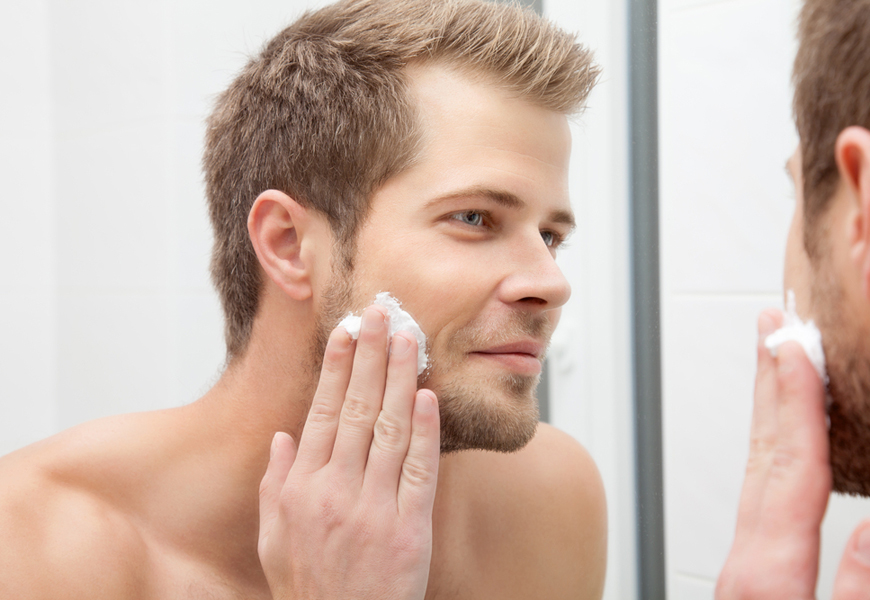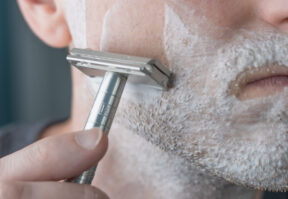Believe it or not: what we do on the outside says a lot about how we feel on the inside. Ever unnecessarily sniped at your mom when she’s asked how your day was? Or lashed out at your best friend for ordering mushrooms on the pizza? We’ve all done it; projected our negative feelings onto something or someone when we’re feeling frustrated, stressed, angry, hurt or unhappy.
Well, the same can be said about your grooming routine. Sometimes too much or too little attention to the way you look can be an indicator of your emotions. Ironically, “most men never learn the optimal way to take care of their grooming routine,” says Joshua Zuchter, an international executive coach, speaker and founder of his eponymous practice. And while there’s no playbook dictating how much is too much mirror time, there are some barometers you can use to gauge your state of mind.
Mirror Mirror
While there is nothing wrong with enjoying quality mirror time, there is too much of a good thing. Obsessive grooming and hygiene, such as over-spritzing cologne, applying too much hair gel or even, emulating Ross on season six of Friends and leaving your DIY teeth whitener on way too long can all be a sign of insecurity. “Perfectionist tendencies, overcompensating for not feeling good enough or simply wanting others to like you often manifest in excessive behaviour,” says Zuchter. “When you’re feeling self-conscious it’s easy to become distracted by your insecurities and sensitive to what others might think of you.”
Should you find yourself in this situation, simply take a step back and ask: what your ultimate goal or intention is. Perhaps you want to attract a partner, secure a new job or receive special attention. “I coach my clients to become conscious about themselves and how they would like to feel and present themselves, overall,” says Zuchter. Rather than trying to impress others or create an opportunity, fulfill your grooming needs because you are inspired to look and feel good about yourself for yourself. “Self-confidence comes from within and those who are self-confident groom because they enjoy the ritual. Interestingly, they also don’t tend to overdo it, because they are doing it for themselves and not trying to sway others in some way.”
Zero Face Time
The flipside to this of course, is not grooming or participating in a minimal regime. Okay sure, maybe you brush your teeth, but when you’ve got a month’s worth of scruffy-looking facial hair and never remember to apply deodorant it’s not a good thing. This can be a sign of sadness, depression or low self-worth. “When you feel low or down, you’re not apt to do things that feel good, like taking care of yourself physically,” affirms Zuchter. “Good grooming and hygiene will actually make you feel better. When you care about yourself enough, you like to take care of all of yourself, inside and out.”
It’s normal to falter though, particularly if you’ve experienced a set back like a break up or divorce or lost your job or a loved one. In these moments, Zuchter recommends gently reminding yourself, “you are a whole person, not just a body. It is important to prioritize this and take care of all of you so that you can start to feel great about yourself, again. Once you do, you’ll begin to naturally emit positive feelings and life just becomes better.” Working with a life coach can also help you reach a happier state of mind, discover more about who you are and support you in achieving greater confidence, focus and productivity.
The Balancing Act
Motivation is key. When you are in a motivated state, it takes less energy and you are more driven to maintain a clean and healthy environment, complete with a solid grooming regime. “It’s easier to maintain a balanced grooming routine when you have momentum,” affirms Zuchter. Booking next month’s hair cut with your stylist while you’re still sitting in their chair, adding alerts to your Outlook to remind you of your weekly shave at the barbershop or even asking to tag along to your girlfriend’s pedicure appointment are all proactive ways to keep your routine consistent without going overboard. “There is a major difference between self-awareness and self-consciousness,” adds Zuchter. “A man who is self-aware is confident, secure, focused, and clear minded and will likely not overdo it. When you feel good physically that is transmitted to others. You make better choices, feel more in charge of your life and ultimately enjoy life more.”












